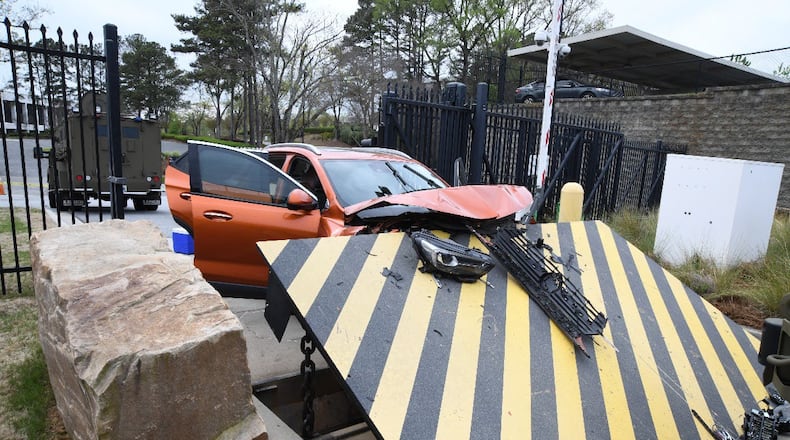A man accused of trying to breach the gate at the FBI’s Atlanta headquarters a week ago will remain in custody while his mental health is evaluated.
Ervin Lee Bolling, 48, appeared Monday before U.S. Magistrate Judge Catherine M. Salinas, who said she wasn’t comfortable releasing him from custody “without a real plan of where he can go.”
“Somebody needs to keep an eye on him,” the judge said.
Bolling is a decorated U.S. Navy veteran who was honorably discharged in 2017 after nearly 20 years of service, Takiya Wheeler, his court-appointed attorney, told the judge. Wheeler said Bolling has no criminal history and does not present a danger to the community, though he is in the midst of a mental health crisis.
“Suicidal ideation alone is not a danger to the community,” Wheeler said. “He’s having a crisis right now, which is evident.”
Bolling is accused of damaging “the final denial barrier” April 1 inside the gate of the FBI’s facility on Flowers Road in Chamblee by ramming it in an orange Buick Encore, according to a federal affidavit. After crashing, prosecutors said he got out of the car and tried to follow an FBI employee into the secure parking lot area by walking past the gate. He then refused to comply with the special agents detaining him, the affidavit stated.
“The safety of our employees is of paramount concern for us at the FBI, and any attempts to breach our facility will be met with stiff penalties,” FBI Atlanta Special Agent Keri Farley said in a news release Tuesday. “Thanks to agents’ diligence and quick-thinking, the incident was prevented from escalating into a more dangerous situation, and for that we are grateful. We will continue to do everything in our power to ensure the continued safety of our employees.”
Credit: FBI
Credit: FBI
Bolling was taken to Grady Memorial Hospital and made his first court appearance Wednesday, when Salinas ordered him to be held until Monday’s hearing. Prosecutors had argued the South Carolina resident was a risk to flee or obstruct justice.
Two of Bolling’s nieces were in court Monday and told the judge he could live with them in South Carolina once his mental health was stabilized with medication. The judge scheduled a hearing for April 23 when Bolling’s bond request will be further discussed.
Wheeler said Bolling’s mental state had already improved with some medication in the past few days and that he had made appointments to visit a Veterans Affairs hospital. She said Bolling was a self-employed insurance salesman who had also been offered work at a Waffle House in South Carolina alongside a relative.
Bolling’s wife, with whom he does not live, is also willing to support him, Wheeler said.
“I do not believe that he should be detained,” she said.
The judge said Bolling’s detention through April 23 would give the government time to assess the information on his personal phone, for which a search warrant was issued.
“Times are crazy right now,” the judge told Bolling. “I have to ensure the safety of the community and ensure you will come back to court. I don’t think you are a flight risk unless we don’t get this mental health stuff figured out.”
Upon release from the hospital, Bolling told federal agents that driving into the FBI barrier was a suicide attempt, FBI agent Matthew Upshaw testified Monday. Upshaw said he searched Bolling’s vehicle and found no weapons or evidence that Bolling had planned an attack.
After taking Bolling into custody, agents searched him and found that he was carrying his passport.
Federal prosecutor Katherine Terry sought Bolling’s continued detention Monday, stating his living situation “is in flux.”
“The information we have is that he’s having a mental health issue and there’s nothing yet that we’ve found that would suggest a larger issue,” Terry said. “However, we are still investigating. His current mental state and his actions are creating a danger to the community.”
Bolling faces one federal count of destruction of government property. He is also charged with violating state law in DeKalb County and faces one count of interference with government property, local officials said.
Upshaw said Bolling could be hit with a $35,000 bill if the barrier needs repairing, or a $70,000 bill if it needs to be replaced.
The impact with the wedge barrier caused damage that exceeded $1,000, a threshold that increases the suspect’s maximum possible sentence from one to 10 years in prison, according to the U.S. legal code. The wedge barrier, also known as the final denial barrier, rises back into place after each authorized car passes through.
In the release, U.S. Attorney Ryan K. Buchanan said Bolling’s alleged actions “created a risk of safety to federal agents and staff that cannot be tolerated.”
“The safety of our law enforcement partners is one of the highest priorities of this office,” Buchanan added.
The Latest
Featured



